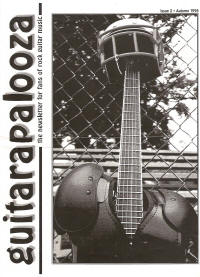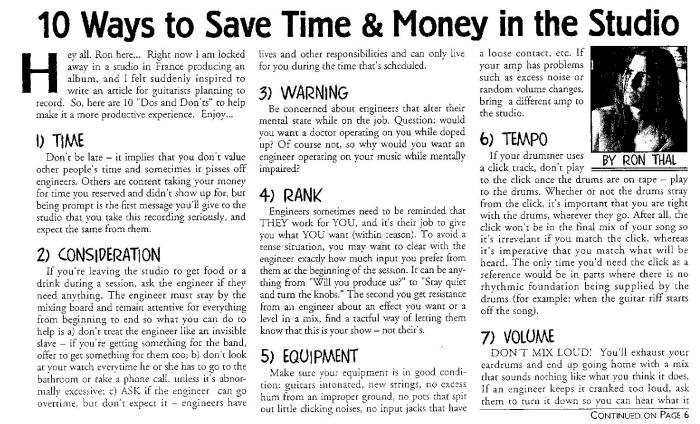|
 Guitarapalooza 'zine Guitarapalooza 'zine
Issue 2, Autumn 1998
10 Ways to Save Time & Money in
the Studio
Hey all, Ron here... Right now I am locked away in a studio in
France producing an album, and I felt suddenly inspired to write an
article for guitarists planning to record. So, here are 10 "Dos and
Don'ts" to help make it a more productive experience. Enjoy...
1) TIME
Don't be late - it implies that you don't value other people's time
and sometimes it pisses off engineers. Others are content taking
your money for time you reserved and didn't show up for, but being
prompt is the first message you'll give to the studio that you take
this recording seriously, and expect the same from them.
2) CONSIDERATION
If you're leaving the studio to get food or a drink during a
session, ask the engineer if they need anything. The engineer must
stay by the mixing board and remain attentive for everything from
beginning to end so what you can do to help is a) don't treat the
engineer like an invisible slave - if you're getting something for
the band, offer to get something for them to; b) don't look at your
watch every time he or she has to go to the bathroom or take a phone
call, unless it's abnormally excessive; c) ASK if the engineer can
go overtime, but don't expect it - engineers have lives and other
responsibilities and can only live for you during the time that's
scheduled.
3) WARNING
Be concerned about engineers that alter their mental state while on
the job. Question: would you want a doctor operating on you while
doped up? Of course not, so why would you want an engineer operating
on your music while mentally impaired?
4) RANK
Engineers sometimes need to be reminded that THEY work for YOU, and
it's their job to give you what YOU want (within reason). To avoid a
tense situation, you may want to clear with the engineer exactly how
much input you prefer from them at the beginning of the session. It
can be anything from "Will you produce us?" to "Stay quiet and turn
the knobs." The second you get resistance from an engineer about an
effect you want or a level in a mix, find a tactful way of letting
them know that this is your show - not theirs.
5) EQUIPMENT
Make sure your equipment is in good condition: guitars intonated,
new strings, no excess hum from an improper ground, no pots that
spit out little clicking noises, no input jacks that have a loose
contact, etc. If your amp has problems such as excess noise or
random volume changes, bring a different amp to the studio.
6) TEMPO
If your drummer uses a click track, don't play to the click once the
drums are on tape - play to the drums. Whether or not the drums
stray from the click, it's important that you are tight with the
drums, wherever they go. After all, the click won't be in the final
mix of your song so it's irrelevant if you match the click, whereas
it's imperative that you match what will be heard. The only time
you'll need the click as a reference would be in parts where there
is no rhythmic foundation being supplied by the drums (for example:
when the guitar riff starts off the song).
7) VOLUME
DON'T MIX LOUD! You'll exhaust your eardrums and end up going home
with a mix that sounds nothing like what you think it does. If an
engineer keeps it cranked too loud, ask them to turn it down so you
can hear what it REALLY sounds like. If it sounds right at a low
volume, it'll sound right at a loud volume - NOT vice versa.
8) CONSISTENCY
If your guitar's volume knob isn't on 10, try not to touch it or
change it until the part you're recording is finished and permanent.
DON'T make adjustments to your amplifier during a part that isn't
complete. If you need a punch-in on that track to fix a mistake,
you'll kill a lot of time trying to match the sound you had.
9) KNOW YOUR MUSIC
Make sure you have all the parts worked out; know your song
arrangements! While you're at it, make sure everyone else in
the band knows the arrangements, including where the accents in the
rhythms occur so the band is in sync, and make sure that the song is
fully written. You'll waste valuable recording time if you have to
write parts of the song on the clock or spend hours on
trial-and-error takes.
10) REALITY
STAY FOCUSED. Don't get bent out of shape if you make a mistake; you
can always do another take. On the other hand, don't spend hours on
just one riff - stick to recording what you're capable of doing
instead of wasting time trying to play things you haven't gotten
down yet. Remember: you only need to be good enough to play your own
songs.
Best of luck!
~
Ron Thal |

